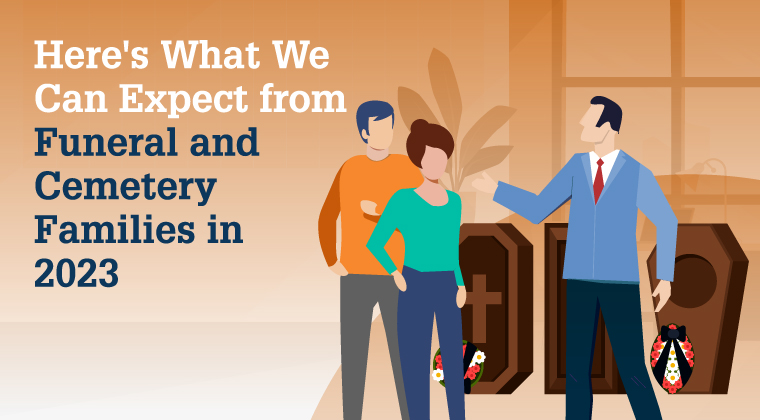COVID-19 heavily impacted the death care profession, preventing people from gathering in person and accelerating a number of existing trends, both in terms of families and employees. In 2023, we can expect the increasing popularity of alternative memorial services, as well as continuing issues related to staffing.
More Cremations
In 1980, the cremation rate in the United States was just shy of 10%. As of 2021, the cremation rate has soared to nearly 60%, and this trend is only expected to continue.
While there are likely a variety of factors contributing to the popularity of cremations—a more secular population and the low costs of cremations, to name a couple—funeral directors should anticipate a growing demand for these types of services.
More Non-Traditional Burials and Services
Similar to cremations, non-traditional burials and services are also growing in popularity. This includes eco-friendly burials, aquamation, and ceremonies that make creative use of cremated remains.
Of the growing majority of those who elect for cremation, nearly 70% of them don’t want their cremated remains in a cemetery. Instead of interring cremated remains, many people are choosing to turn them into diamonds or use them as part of the soil for a tree. Alternatively, many people wish to scatter ashes in sentimental places.
Funeral businesses should be prepared to pivot to these types of services rather than forcing traditional models on families.
Virtual Presentations and Funeral Service Gatherings
During the pandemic, when in-person gatherings were impossible to conduct safely, virtual services held over Zoom or Skype offered a necessary substitute. However, virtual presentations and services are still worth considering.
Families might even prefer to hold a hybrid service, in which an in-person service is accompanied by a virtual component, allowing those who are sick or live far away to pay their respects.
Making Arrangements Online
In a world where we can do everything from the comfort of our homes, many people these days expect the ability to make their arrangements online. Across a variety of industries, we are seeing a growing number of families who’d prefer to schedule services and appointments online.
In the death care profession, that includes planning the funeral, making cremation arrangements, and booking services – all online. It can also apply to the paperwork and legal components of a funeral service. The more you can offer online options for people, the better.
Staffing Challenges
Similar to many other industries, the funeral profession is experiencing a shortage of talent in the wake of the Great Resignation, making it essential to review your compensation plans and company culture. Ensure that your workplace is attractive to potential new hires.
Additionally, you’ll need a plan in place—one that starts with the onboarding process—that invests in the growth of your team members. If your employees can’t see a future at your workplace, they’ll soon leave for other opportunities.
Shifting Death Rate
Since 2013, death rates in the United States have continued to climb, increasing the need for funeral services. In the coming years, some predict this trend will continue, while others expect a reversal.
Either way, you’ll want to account for both possibilities in your planning and strategy. You don’t want to stop investing in growth, nor should you spread yourself too thin, offering a mind-boggling number of services not relevant to your families. The best way to remain on top of death care trends is to lean on the help of those who know the greater marketplace, that is, death care consultants.
At Johnson Consulting Group (JCG), our team of funeral business consultants has decades of experience partnering with funeral businesses of all sizes and developing winning strategic plans. Whether your funeral business is just starting out or you’re looking to re-invigorate your process, the team at JCG can help.
GET IN CONTACT
